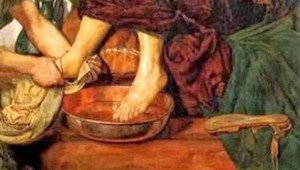Last night while JJ was bathing the baby, I recalled one of my favorite memories from serving the church. On the last night of our mission trip to Mexico, one of the adults on the trip washed the feet of his high school aged son. I was supposed to be the leader of the trip, and there I was, hiccuping back my tears. (Let’s be fair: everyone was crying. It was the last night of the trip, we were inspired from the work and teaching, and dead tired. They probably had Michael W. Smith playing in the background.)
Why is it when one washes a 4-month-old, it’s called parenting, but when the feet are 16 years old, it becomes servanthood?
Not to take away from the service of rearing small children – I do this daily, and I liken it to service. But I’ve never cried at bath time – at least, not over the power of the moment of washing my children.
Perhaps service becomes more powerful when we do something for those who could do it for themselves.
“Service”generally gets paired with those who need help – we feed the hungry, educate the poor, provide clothes and medicine for the sick. These are good things and we need to continue to do them – out of respect for humanity, following the example of Jesus, under the command of God to live justly and have mercy.
But I might not categorize these as service. These are alms, caring for those who Jesus holds dear, the least of these.
When Jesus talks about becoming a servant, he’s washing the feet of grown, capable men. And not just men who want the best for him – he’s washing the feet of his betrayer.
In our culture, we value the power of the pulled bootstrap. We want self-sufficiency and productivity. One of my goals as a parent is raise contributing members of society – and these are not bad things. But I’m not sure they were the goal or example of Jesus.
The 5-year-old is now in some sort of laziness stage, asking us to do all kinds of tasks that he has been doing for years – getting a glass of water, retrieving his socks from the drawer, putting away toys. My response sometimes is frustration – do it yourself, child! I wonder, though, if the example set before me in John 13 is put on the apron and serve. To live an example that I will serve those who are capable because I love them.
We worry about this kind of service, probably out of fear that we’re being taken advantage of – a power struggle. I heard a message by Jonathan Martin where he said, “We’re all about being a servant until someone starts treating us like one.” That’s our fear: that people use our service as an excuse to lower our status. Our hard-earned climb.
But the entire story of the upper room began with, “Jesus knew that the Father had put him in complete charge of everything, that he came from God and was on his way back to God. So he got up from the supper table, set aside his robe, and put on an apron.”(John 13:3). It ends with the command, “If you understand what I’m telling you, act like it – and live a blessed life.”

